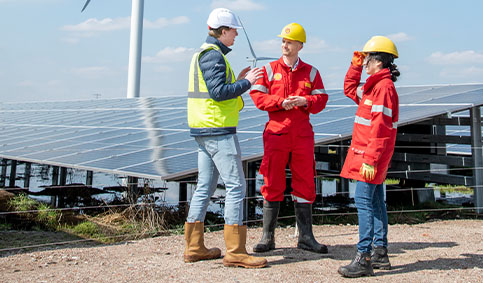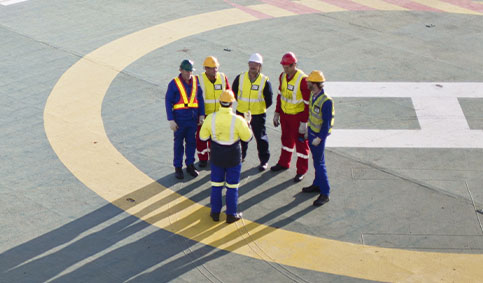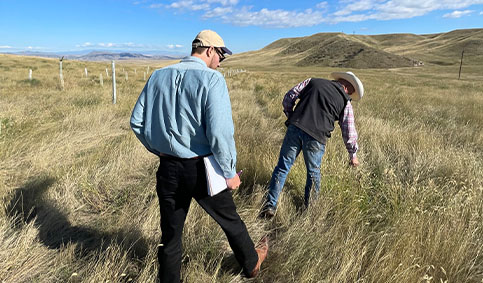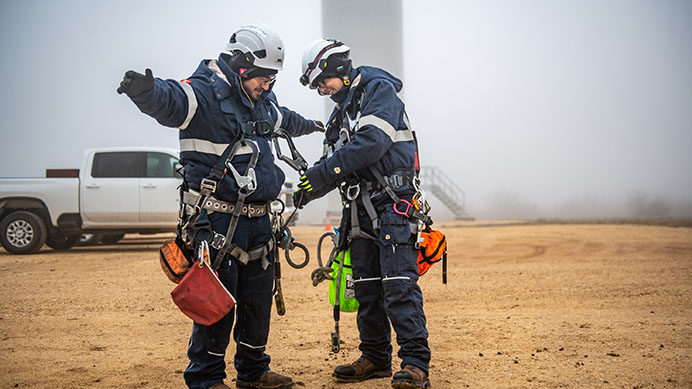Personal safety
We continue to strengthen the safety culture and leadership among our employees and contractor staff. This aligns with our focus on caring for people.
When our employees and contractors perform tasks, we expect them to consider the hazards that could potentially cause serious harm and the effectiveness of the barriers in place to avoid serious harm.
We run safety awareness programmes and hold an annual global Safety Day to give employees and contractors time to discuss safety culture on the frontline, reflect on how to prevent incidents and how to improve performance. In 2023, the focus was on ”failing safely”, which means we recognise that people make mistakes and that our barriers need to be capable of managing the impact of those mistakes to prevent harm.
In 2023, we achieved safe construction, commissioning and start-up of a floating production unit (FPU) for the Shell-operated Vito field (Shell interest 63.1%) in the US Gulf of Mexico. The fabrication of another FPU, Whale (Shell interest 60%) in the Gulf of Mexico, was completed in 2023 after 12 million hours without fatality or serious injury.
Working with others
We work with contractors and suppliers to help them understand our safety requirements. We strive to help improve the energy industry’s safety performance by sharing safety standards and experience with other operators, joint-venture partners, contractors and professional organisations.
In 2023, senior executives from Shell’s 23 major global contractors joined Shell executives in Norway for our annual Contractor Safety Leadership workshop. Focus areas of discussion were worker welfare and human rights, mental health, and technology solutions for safer work at the frontline.
Also in 2023, leadership teams from 25 Shell joint ventures and companies newly acquired by Shell met in the Netherlands to discuss topics such as worker welfare and industry standards, and the importance of alignment on safety.
Fatal accident rate
Fatal accident rate (FAR)
Number per 100 million hours
Serious injuries and fatalities
We are deeply saddened to report that four of our contractor colleagues in Shell-operated ventures lost their lives in 2023 in the course of their work for Shell. An additional contractor colleague who was injured in 2023, succumbed to their injuries in February 2024. One contractor colleague in Malaysia died during scaffolding work, and one in the Philippines died after a fall from height. Two contractor colleagues in Nigeria died in a security incident, along with four government security agents. In Nigeria, another contractor colleague injured in a tugboat fire incident later passed away.
These losses have a deep and far-reaching impact on families, friends and colleagues. We are determined to learn from these incidents and take steps to prevent something similar from happening again. We continue to work closely with our contractors to help build a strong safety culture at the frontline.
The number of serious injuries and fatalities increased to 12 (five fatalities [A] and seven serious injury cases) in 2023 from nine in 2022.
[A] Fatalities in 2023 include one contractor colleague who was injured in a 2023 incident and unfortunately succumbed to their injuries in February 2024.
Serious injury and fatality frequency (SIF-F) [A] [B]
Number per 100 million hours
[B] Data before 2019 are not available. The number of SIF cases for 2019 and 2020 reflects the best estimate. Combined workforce SIF frequency for 2019–20 was adjusted to account for some uncertainty in the number of SIF cases.
Since 2021, we measure the number of serious injuries and fatalities per 100 million working hours, as well as the total recordable case frequency, which measures injuries per million working hours. The serious injury, illness and fatality frequency (SIF-F) enables us to focus our investigations on the most serious incidents. The aim is to collect and analyse relevant, high-quality data that can help us improve our efforts to prevent serious injuries and fatalities.
In 2023, the SIF-F was 2.6 injuries and illnesses per 100 million working hours, compared with 2.0 in 2022.
Total recordable case frequency
Total recordable case frequency (TRCF)
Number per million hours
In 2023, the number of injuries per million working hours — the total recordable case frequency — was 1.1, an increase from 1.0 in 2022. The increase was primarily due to incidents in new acquisitions and growth in the Downstream, Renewables and Energy Solutions business.
Lost time injury frequency
Lost time injury frequency (LTIF)
Number per million hours
The level of injuries that led to time off work in 2023 increased to 0.5 cases per million hours compared with 0.4 in 2022. The increase was primarily due to incidents in new acquisitions and growth in the Downstream, Renewables and Energy Solutions business.
Read more about our approach to personal safety at www.shell.com/sustainability/safety/personal-safety.
Learn more about how Shell’s 2023 safety performance impacted the Executive Directors’ remuneration in the Directors’ Remuneration Report in our 2023 Annual Report.









